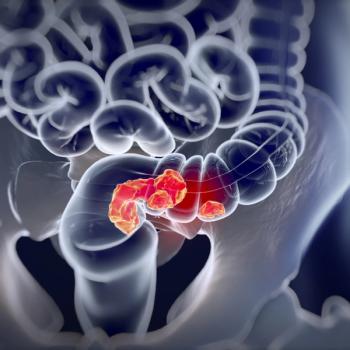
Videos

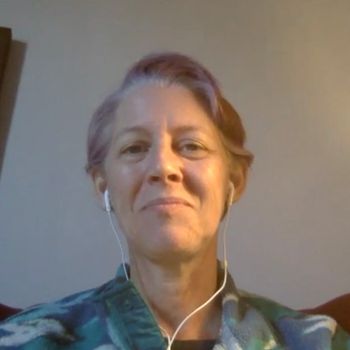
Now more than ever, it is important for new nurses to keep their head up and ensure that their voice is heard, according to Theresa Brown, RN.


Oncology providers reported having limited knowledge of the special concerns of LGBTQ patients, but wanted to know more.

Recent years have brought many changes to the treatment of patients with HER2-positive metastatic breast cancer.

Evaluating the benefits of the subQ vs IV formulation of the trastuzumab-pertuzumab combination for the management of HER2+ breast cancer and examining the potential use of at-home administration.


Clinicians should not be apprehensive to broach the topic of sexual health.
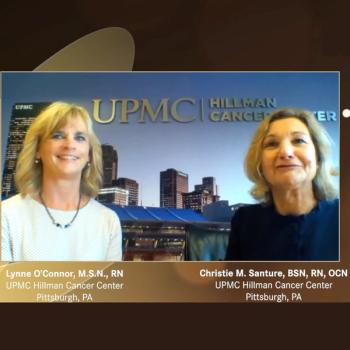
When the coronavirus disease 2019 (COVID-19) pandemic prevented Christie M. Santure, BSN, RN, OCN, from hosting her caregiver support group, she quickly adapted and switched to a virtual format.

Oncology nurses need to keep an eye out for diarrhea in their patients on CDK4/6 inhibitors.

Great men and women are forged through fire, so people who are passionate about health care should not put a nursing degree on hold because of the COVID-19 pandemic.

Small cell lung cancer is very sensitive to chemotherapy, but immunotherapy offers another line of treatment for when chemotherapy stops working.

A phase 3 trial designed to evaluate eprenetapopt plus azacytidine (Vidaza) in patients with TP53-mutant positive myelodysplastic syndrome (MDS) completed full enrollment, according to Aprea Therapeutics, Inc.

Oncology Nursing News sat down with Brian Rini, MD, from the Vanderbilt-Ingram Cancer Center (VICC), to discuss results from the phase III TIVO03 trial, and its potential impact on patients with relapsed or refractory renal cell carcinoma.
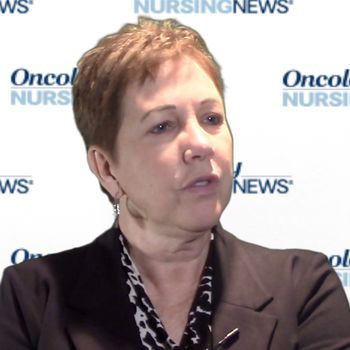
There is far less patient education for oral agents, such as CDK4/6 inhibitors for breast cancer, as there is for chemotherapy. This is a major issue, explained Patricia Jakel, MN, RN, AOCN, advanced practice nurse at UCLA's solid tumor program and co-editor in chief of Oncology Nursing News.

The availability of evidence-based research may help make clinicians more comfortable discussing sexual issues with cancer survivors.

With minimally invasive procedures to test lung cancer tumors, there often isn't enough tissue to undergo a full biomarker test, pointing toward the strength of liquid biopsies, explained Lynette M. Sholl, MD, chief of thoracic pathology at Brigham and Women's Hospital, Dana-Farber Cancer Institute, and associate professor at Harvard Medical School.

Radiation therapy is key in treating patients with small cell and non-small cell lung cancer, explained Terence T. Sio, MD, MS, radiation oncologist and assistant professor of radiation oncology at the Mayo Clinic.

There are multiple factors in making "cold" breast cancer tumors "hot," meaning that they respond to chemotherapy, explained Hope S. Rugo, MD, FASCO, director of Breast Oncology and Clinical Trials Education at the University of California San Francisco (UCSF) Helen Diller Family Comprehensive Cancer Center.

There are many issues that women can face after undergoing treatment for gynecologic cancers.

An oncologist discusses the scary unknowns of COVID-19.

Oncology nurses made it a point to get to know Barbara Bigelow, a breast cancer survivor, while she was getting treatment. To her, that made a big difference.

Aditya Bardia, MD, MPH, attending physician at Massachusetts General Hospital and assistant professor of medicine at Harvard Medical School, discusses COVID-19 (Coronavirus) risk in patients with cancer and the elderly.

Some patients with breast cancer might be apprehensive to undergo genetic testing, but it is crucial both for them and their family members. Lauren Carcas, MD, medical oncologist at the Miami Cancer Institute, discusses some main points nurses can make to these patients to encourage them to get tested.

Some metastatic breast cancer data is not available. And some patients choose not to know it.

Healthcare value has been defined as outcomes divided by costs, but it's not always that simple, especially in treating patients with cancer, explained Stuart L. Goldberg, MD, Chief, Division of Outcomes and Value-Based Care at the John Theurer Cancer Center and associate professor of medicine at Seton Hall School of Medicine.

Electronic medical records (EMRs) are crucial for nurses to track adverse events and other important information for patients undergoing CAR T-cell therapy, explained Andrea Price, APN, associate director for clinical research at Washington University School of Medicine.

There are concerns when a patient undergoes a cytoreductive nephrectomy after immunotherapy or targeted therapy that nurses should be aware of.
